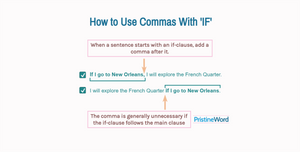
Expand your vocabulary, improve your grammar skills, and develop your own unique writing style.

If a sentence starts with an if-clause, add a comma after the if-clause. Do not use a comma when the sentence starts with the main clause.
If a sentence starts with an if-clause , add a comma after it.
If I go to New Orleans, I will explore the French Quarter.
If I go to New Orleans I will explore the French Quarter.
The comma is generally unnecessary if the if-clause follows the main clause.
I will explore the French Quarter if I go to New Orleans.
Examine this example:
If you are hungry, you can cook rice.
This sentence has two clauses:
When starting a sentence with a dependent clause, add a comma after it.
If you go to England, you have to try the fish and chips.
If you go to England you have to try the fish and chips.
The conjunction " if " has a similar meaning to "whether". In fact, the comma rules for "whether" and " if " are analogous.
Follow the same comma policy when using shorter versions of an if-clause, such as "if necessary" or "if required".
When the if-clause follows the main clause, the comma before " if " is generally unnecessary.
Call me if you need anything.
Call me, if you need anything.
However, there are exceptions to this practice of not using a comma before " if " in mid-sentence. For example, use a comma to introduce an if-clause as a side note or parenthetic expression (information that could be easily placed between parentheses).
We could go to the movies tomorrow night, if you like.
I wouldn't worry about that, if I were you.
I learned a few tricks that I'll keep to myself, if you don't mind.
When using other subordinating conjunctions, such as "because", follow the same comma strategy.
Link copied to clipboard!